
Findings from the phase 3 NAPOLI 3 trial support NALIRIFOX as a novel reference regimen for first-line metastatic pancreatic ductal adenocarcinoma.

Your AI-Trained Oncology Knowledge Connection!


Findings from the phase 3 NAPOLI 3 trial support NALIRIFOX as a novel reference regimen for first-line metastatic pancreatic ductal adenocarcinoma.
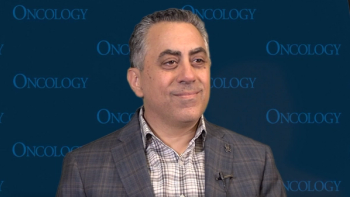
Data from the PARADIGM trial that were presented at 2022 ASCO demonstrated that panitumumab plus FOLFOX should be standard of care for patients with left-sided, RAS wild-type colorectal cancer, according to Tanios S. Bekaii-Saab, MD.

Tanios S. Bekaii-Saab, MD, discussed how data from clinical trials examining different targeted strategies in colorectal cancer will transform the way in which patients with this malignancy are seen and treated.

At 2022 ASCO, Tanios S. Bekaii-Saab, MD, talks about how data from the ongoing MOUNTAINEER trial investigating trastuzumab plus tucatinib in HER2-positive metastatic colorectal cancer and other similar trials may impact the standard of care going forward.

At 2022 ASCO, Tanios S. Bekaii-Saab, MD, reviews the MOUNTAINEER trial of trastuzumab plus tucatinib for HER2-positive metastatic colorectal cancer and foreshadows how an approved regimen may help improve outcomes in this patient population.
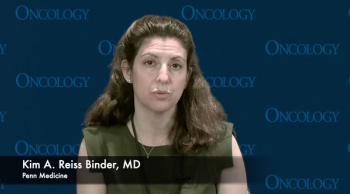
Kim A. Reiss Binder, MD, spoke about the phase 1 CARISMA trial which investigated CAR macrophages in HER2-overexpressing solid tumors.
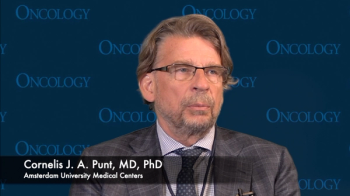
Cornelis J. A. Punt, MD, PhD, spoke about the phase 3 CAIRO5 trial of bevacizumab plus either FOLFOXIRI or FOLFOX/FOLFIRI for patients with initially unresectable colorectal liver metastases.

Kim A. Reiss Binder, MD, spoke about the use of niraparib plus either nivolumab or ipilimumab for patients with platinum-sensitive advanced pancreatic adenocarcinoma.
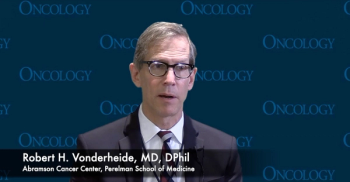
Biosignatures data from the PRINCE trial show sophisticated precision approaches may be necessary to optimize chemoimmunotherapy use in pancreatic ductal adenocarcinoma.

MAOB and CDC37 gene expression appear to be 2 new promising targets in advanced colorectal cancer, according to Heinz-Josef Lenz, MD.

At the 2022 American Society of Clinical Oncology Annual meeting, Robert H. Vonderheide, MD, DPhil, and colleagues from the Parker Institute for Cancer Immunotherapy present research into biosignatures of survival with different chemoimmunotherapy regimens for pancreatic ductal adenocarcinoma.

Shubham Pant, MD discusses key findings from a basket trial examining the use of erdafitinib in patients with gastrointestinal and other solid tumor malignancies.
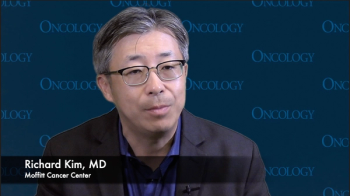
During the 2022 American Society of Clinical Oncology Annual Meeting, Richard Kim, MD, discusses the rationale for the phase 1b KEYNOTE-651 trial examining pembrolizumab plus chemotherapy in metastatic colorectal cancer.

A 100% clinical complete response rate was observed when patients with stage II/III mismatch repair-deficient locally advanced rectal cancer were treated with dostarlimab.

Adding irinotecan to chemotherapy plus panitumumab for treatment of metastatic colorectal cancer did not result in a significant impact on efficacy.

Superior efficacy was observed when patients with RAS wild–type metastatic colorectal cancer were treated with panitumumab plus chemotherapy vs bevacizumab in the first-line setting.

A Claudin18.2–specific CAR T-cell therapy has shown promise in the treatment of patients with heavily pretreated advanced gastric and pancreatic adenocarcinoma whose disease expresses the marker.

Use of circulating tumor DNA to guide adjuvant treatment planning for patients with resectable colon cancer led to fewer patients receiving chemotherapy while maintaining outcomes, according to the DYNAMICS study.

Nimotuzumab plus gemcitabine improved overall survival in patients with KRAS wild-type advanced pancreatic cancer, especially in those who did not need surgery for obstruction of a pancreatic bile duct.
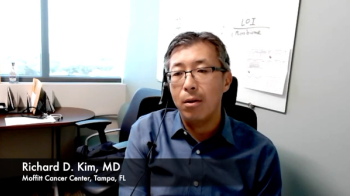
CancerNetwork® sat down with Richard D. Kim, MD, of the Moffitt Cancer Center at the 2021 ASCO Annual Meeting to talk about the many ways oncologists can approach treating hepatocellular carcinoma with combination regimens.

At ASCO 2021, Tanios S. Bekaii-Saab, MD, talked about some of his research in patients with IDH1/2–positive cholangiocarcinoma presented at the meeting.
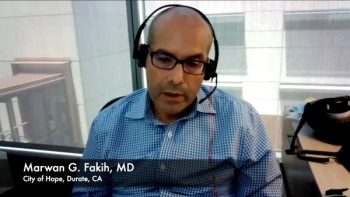
CancerNetwork® sat down with Marwan G. Fakih, MD, of City of Hope at the 2021 ASCO Annual Meeting to talk about a potential multidisciplinary treatment approach to colorectal cancer with regorafenib/nivolumab.

At the 2021 American Society of Clinical Oncology Annual Meeting, CancerNetwork® spoke with Tanios S. Bekaii-Saab, MD, to discuss recent updates in the treatment of gastrointestinal malignancies.

At the 2021 American Society of Clinical Oncology Annual Meeting, CancerNetwork® spoke with Tanios S. Bekaii-Saab, MD, about genomic drivers in cholangiocarcinoma.
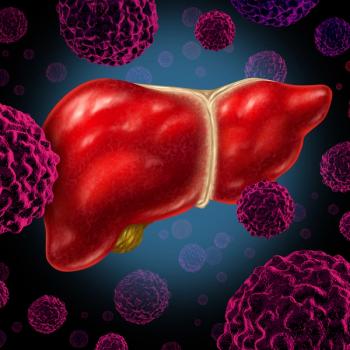
Data from a phase 1b trial of the combination of regorafenib plus pembrolizumab in patients with advanced hepatocellular carcinoma display safety and early efficacy.

Adding toripalimab and hepatic arterial infusion chemotherapy to lenvatinib yielded robust, durable responses for patients with advanced hepatocellular carcinoma.

In line with responses seen at the primary analysis, final results of a phase 2 trial support activity of trastuzumab deruxtecan in HER2-positive metastatic CRC.

Adding panitumumab to 5-FU and leucovorin significantly improved PFS compared with 5-FU/leucovorin alone as a maintenance therapy for patients with RAS wild-type metastatic CRC.

Certain patients with RAS wild-type colorectal cancer should be treated with bevacizumab in place of cetuximab in combination with FOLFOXIRI.

Liposomal irinotecan (Onivyde) plus 5-fluorouracil/leucovorin (5-FU/LV) mproved progression-free survival (PFS) and overall survival (OS) in patients with metastatic biliary tract cancer whose disease had progressed after frontline gemcitabine/cisplatin.